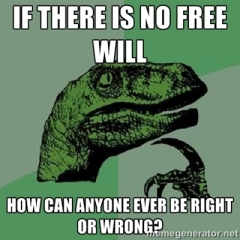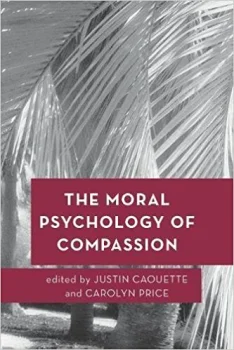If we think that ethics is supposed to tell us what we ought to do (this is the common understanding of ethics see here), and, if our conception of right and wrong is derived from our sense of moral obligation then the thesis of hard incompatibilism poses a serious threat to any ethical system that incorporates these traditional concepts (obligation, right, and wrong).
Hard Incompatibilism is a thesis that defends two central claims; (1) that if an action is completely determined by factors beyond an agent’s control then it cannot be freely willed in the sense required for moral responsibility. And, (2) all of our actions are determined, at least this is what our best science has indicated. Derk Pereboom adopts a similar view in his book Living Without Free Will (2001), though his incompatibilism stretches to indeterminism as well. He thinks that we have no free will whether the world is indeterministic or deterministic.(click here for some explanations regarding some terminology)
 I am not a hard incompatibilist but I will not be focused on refuting the thesis here. My aim will be to try to make sense of some ethical concepts in light of accepting hard incompatibilism. Pereboom argues that a world without the free will required for moral responsibility not only has robust meaning but might be a better world when compared to a world where people believe in free will. Sam Harris, who has adopted a view eerily similar to Pereboom’s, recently claimed that “it could only produce a more compassionate, equitable, and sane society” if we truly believed that free will was an illusion” (see here for his blog post on the topic). Both Harris and Pereboom seem to be misguided. A genuine belief in hard incompatibilism threatens most of our ethical concepts, for example – deontic judgments of moral obligation, right and wrong actions, and permissibility would be imperiled if we were to have a genuine belief in hard incompatibilism, and because of this our lives would be negatively impacted. I will touch on some reasons why such concepts would be imperiled before asking for your thoughts on the matter. Would ethics and the central concepts that make up our ethical system be imperiled without free will?
I am not a hard incompatibilist but I will not be focused on refuting the thesis here. My aim will be to try to make sense of some ethical concepts in light of accepting hard incompatibilism. Pereboom argues that a world without the free will required for moral responsibility not only has robust meaning but might be a better world when compared to a world where people believe in free will. Sam Harris, who has adopted a view eerily similar to Pereboom’s, recently claimed that “it could only produce a more compassionate, equitable, and sane society” if we truly believed that free will was an illusion” (see here for his blog post on the topic). Both Harris and Pereboom seem to be misguided. A genuine belief in hard incompatibilism threatens most of our ethical concepts, for example – deontic judgments of moral obligation, right and wrong actions, and permissibility would be imperiled if we were to have a genuine belief in hard incompatibilism, and because of this our lives would be negatively impacted. I will touch on some reasons why such concepts would be imperiled before asking for your thoughts on the matter. Would ethics and the central concepts that make up our ethical system be imperiled without free will?
Consider moral responsibility: As Ish Haji has put quite nicely “there is a widespread concurrence that the following principle captures an essential metaphysical element of responsibility: …one is either morally praiseworthy or blameworthy for doing something only if one has control regarding or one is free in doing it” (Haji 2012). In other words there is a conceptual connection between a person’s blameworthiness and their ability to act from their own free will. The same connection to one’s free will seems to hold with deontic judgments as well, judgements of obligation, moral right, and moral wrong. Given the ought-implies-can principle (OIC): if one morally ought to do something, then one can do it. Put another way, if a person morally ought to do something then one has the freedom to do it. If this connection holds then hard incompatibilists lose the ability to utilize the very important deontic judgements of moral right, moral wrong, and moral obligation. Here’s how (very briefly).
Keep in mind that we are assuming hard incompatibilism. Consider ‘Boston Bomber’ Dzhokhar Tsarnaev . He was determined to commit the atrocious acts that occurred on April 15th, 2013. Factors beyond his control caused him to set the bombs. Because of this he is not morally responsible. Now, both Pereboom and Harris concede this point. What they do not concede is that we would lose other valuable deontic judgments. For those who may agree that the bombers were not morally responsible would you also be ok with saying that what they did was also morally neutral? That is was not morally wrong for them to do what they did? That they were not obligated to refrain from setting off the bombs? If one is committed to hard incompatibilism then one cannot say that what Tsarnaev did was morally wrong. Given that Tsarnaev couldn’t have done otherwise, a requirement for (OIC), then it is not true that he was obligated to refrain from setting off the bomb. Hard incompatibilists are committed to not only absolving Tsarnaev of all moral responsibility (and everyone else—input the most repulsive criminal you can think of here -Hitler, etc.) but they are committed to saying that what Tsarnaev did was not morally wrong. Hence my concern.
If we lose our ability to call any act morally right or wrong and our ability to make judgments of moral obligation we seem to lose a truly prescriptive ethic. Whether you are a consequentialist, a Kantian, or a Virtue Ethicist, it seems the views you espouse regarding the above mentioned deontic judgments are imperiled. And, if these concepts are needed to make sense of a coherent ethical framework, then so much for the claims made by Harris and Pereboom that a belief in hard incompatibilism would not affect our system of morals. In fact, in subsequent posts, I will show why such a belief also threatens our interpersonal relationships and meaning in our lives.
Thoughts?
_____________________________________________________________________
References
Haji, Ish. 2012. Reason’s Debt to Freedom. Oxford: Oxford University Press
Harris, Sam. 2012. Free Will. New York: Free Press
Pereboom, Derk. 2001. Living Without Free Will. Cambridge: Cambridge University Press.



Paul F. Lenzi
July 1, 2013
all I can say is – amen, and thanks for the cogent presentation
LikeLike
Justin Caouette
July 1, 2013
Thanks, Paul.
LikeLike
T.M
July 3, 2013
Question for you, Justin. We could still have an objective morality though, right? The truth of your claims (and Haji’s) only effect deontic judgments and not the concepts themselves, right? Still a tough pill to swallow for those who accept HD but not damning to all morality, or is it?
Thanks in advance.
LikeLike
Justin Caouette
July 27, 2013
Hard Incompatibilism would seem to imperil the concepts as well. What import could they have without the ability to evaluate one’s character and actions in real time?
LikeLike
Landbeyond
July 3, 2013
It is a real-world fact that hard incompatibilists make “deontic judgements of moral right, moral wrong, and moral obligation”. It seems likely that we are hard-wired to do so, as are some of our close animal relatives. Awareness of determinism can cause us to refrain, on conscious reflection, from moral condemnation of the perpetrators of actions that we dislike (spitting in the street, mass murder and such) and that on a non-reflective level we feel are immoral. That may include ourselves, but usually will not override our deontic judgements of our own actions. (Psychopaths may be an exception, but their views on determinism will, in any case, likely be of small relevance.)
LikeLike
lashuka1
July 4, 2013
I hope you write more on this subject! I must say, I thought this was a pretty interesting read, I never quite thought about the connection between ethics and determinism in this way.
THanks.
LikeLike
Matt Bainbridge
October 17, 2013
I believe even if hard incompatibilism is true we still can have an objective ethic. This will be true if we can agree that what ethics entails is the well being of conscious creatures. We can then through consequentialist ethics make real claims about what is right and wrong, better or worse, I believe. If we are worried about what is best for conscious creatures we can imagine states of the world that are better and worse for them, can we not? This is definitely a morality with great import in my belief even if what we end up doing is out of our control.
LikeLike
Justin Caouette
October 20, 2013
Hi Matt,
I addressed this (briefly) when addressing T.M. earlier in the thread. I agree that we could have an objective ethic. But, whatever ethic one appeals to could not have, as a component, a desert notion of praise or blame (so hard incompatibilism would already limit the kind of ethic you find plausible) . Also, the ethic could not have, as a component, moral obligations or claims about what actions are, in fact, morally right or wrong. The ethic could only claim what is morally good or bad… This is not satisfying to me. The system of ethics would look nothing like what most ethicists see their theories doing. Hard incompatibilism seems to imperil ethics as we know it (though admittedly, a bare bones objective view could still linger).
LikeLike